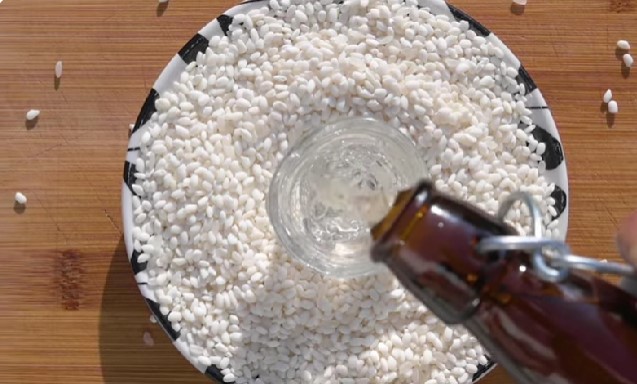Is Rice Wine Halal
Rice wine, often used in Asian cuisines for its unique flavor and aroma, raises important questions about its permissibility in a halal diet. For many Muslims, adhering to dietary laws is a significant aspect of their faith, and the presence of alcohol in any form typically renders a product non-halal. This article delves into whether rice wine is halal, exploring its production, the alcohol content, and the views of Islamic scholars on its consumption.
Understanding Rice Wine
Rice wine is a traditional alcoholic beverage made by fermenting rice starches into sugars, which yeast then converts into alcohol. The fermentation process results in a beverage with alcohol content typically ranging from 15% to 25%. Common types include sake from Japan and traditional rice wines from China and Korea.

Alcohol Content and Halal Status
In Islam, the consumption of alcohol is strictly prohibited, making any beverage containing it haram (forbidden). Since rice wine contains significant amounts of alcohol, it is generally considered haram.
Key Points:
- Alcohol Content: Rice wine contains alcohol levels typically between 15% and 25%.
- Halal Guidelines: Any product with alcohol is usually deemed non-halal.
- Scholarly Opinions: Most Islamic scholars agree that rice wine is haram due to its alcoholic content.
Rice Wine Vinegar: A Halal Alternative?
Rice wine vinegar, despite its similar name, undergoes a different production process where the alcohol is converted into acetic acid. This transformation makes rice wine vinegar permissible for Muslims to consume as it no longer contains alcohol.
Differences Between Rice Wine and Rice Wine Vinegar:
- Production Process: Rice wine is fermented to retain alcohol, while rice wine vinegar is further fermented to remove alcohol.
- Halal Status: Rice wine is haram, whereas rice wine vinegar is generally halal.
Halal Alternatives to Rice Wine
For those following a halal diet, there are several non-alcoholic substitutes available that can mimic the flavor profile of rice wine in cooking:
- Apple Juice: Adds a sweet and tangy flavor.
- White Grape Juice: Provides a similar sweetness without the alcohol.
- Lemon or Lime Juice: Offers an acidic punch that can replace the tanginess of rice wine.
- Chicken Stock: Used in savory dishes to add depth without alcohol.
Where to Buy Halal Products
Halal-certified products are widely available in many supermarkets and specialty stores. When looking for halal substitutes for rice wine, ensure that the products are clearly labeled as halal. Some specific halal-certified rice vinegars and cooking wines can be found in stores or online, providing a safe alternative for Muslim consumers.
Frequently Asked Questions
Can rice wine be used in halal cooking?
Rice wine itself is not halal due to its alcohol content. Muslims should use halal alternatives like rice wine vinegar, which has undergone a fermentation process that removes the alcohol content, making it permissible to use in cooking.
Is there any halal certification for rice wine vinegar?
Yes, rice wine vinegar can be halal certified. Look for products that have been certified by reputable halal certification bodies to ensure they meet the necessary dietary guidelines.
How can I ensure that the rice wine vinegar I buy is halal?
Check the label for a halal certification or consult the product’s ingredients list to ensure no non-halal additives or alcohol content remain. It’s also advisable to buy from trusted brands that specifically state their products are halal.
Can rice wine vinegar be used as a substitute for rice wine in recipes?
Yes, rice wine vinegar can be used as a substitute for rice wine in recipes. It provides a similar tangy flavor without the alcohol, making it suitable for halal cooking.
Does rice wine vinegar taste different from rice wine?
Yes, rice wine vinegar has a tangy and slightly acidic taste, which is different from the sweeter and more alcoholic taste of rice wine. However, it can still provide a similar depth of flavor to dishes.
Where can I buy halal rice wine vinegar?
Halal rice wine vinegar can be found in many supermarkets, Asian grocery stores, and online retailers. Look for the halal certification on the packaging to ensure it meets Islamic dietary laws.
Are there other halal alternatives to rice wine?
Yes, there are several halal alternatives to rice wine, including apple cider vinegar, white vinegar, and lemon juice. These alternatives can provide the necessary acidity and flavor without alcohol.
Does all vinegar contain alcohol?
Not all vinegar contains alcohol. The fermentation process for vinegar involves converting alcohol into acetic acid. However, it’s important to ensure that no residual alcohol remains and that no additional non-halal ingredients are present.
Can Muslims consume products with rice wine vinegar?
Yes, Muslims can consume products made with rice wine vinegar, provided the vinegar is halal certified and does not contain any non-halal additives.
Is the fermentation process for rice wine vinegar different from that of rice wine?
Yes, rice wine vinegar undergoes an additional fermentation process where acetic acid bacteria convert the alcohol from rice wine into acetic acid. This process removes the alcohol content, making the vinegar halal.
Is seasoned rice wine vinegar halal?
Seasoned rice wine vinegar may contain added sugar, salt, and other ingredients. It’s important to check the label for any non-halal additives and ensure the product is halal certified.
Can I use regular rice vinegar instead of rice wine vinegar in halal cooking?
Yes, regular rice vinegar can be used as a substitute for rice wine vinegar in halal cooking, as long as it does not contain any non-halal ingredients and is halal certified.
Are all types of vinegar halal?
Most types of vinegar, including white vinegar, apple cider vinegar, and balsamic vinegar, are considered halal as long as they are made from halal ingredients and do not contain residual alcohol or non-halal additives.
What should I do if I am unsure about the halal status of a vinegar product?
If you are unsure about the halal status of a vinegar product, consult with a knowledgeable Islamic scholar or refer to reputable halal certification bodies for guidance. It’s always best to err on the side of caution and choose products with clear halal certification.
Can I make halal rice wine vinegar at home?
Making halal rice wine vinegar at home involves fermenting rice into rice wine and then allowing acetic acid bacteria to convert the alcohol into acetic acid. However, ensuring the process is free from cross-contamination with non-halal substances can be challenging, so it’s generally recommended to purchase halal-certified products.
Conclusion
In conclusion, rice wine is not halal due to its alcohol content. However, rice wine vinegar is an acceptable alternative as it does not contain alcohol after fermentation. For cooking purposes, various non-alcoholic substitutes can provide similar flavors. As always, Muslims should seek guidance from knowledgeable religious authorities to ensure their dietary choices align with their faith.
Read also: Is Cooking Wine Halal





